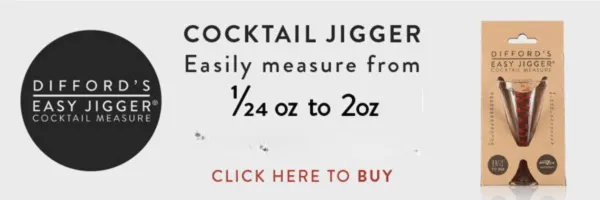Fourth Degree

Glass:
Serve in a Coupe glass
| 1 oz | Hayman's London Dry Gin |
| 1 oz | Ambrato/ambre/amber vermouth |
| 1 oz | Strucchi Rosso Vermouth |
| 4 dash | La Fée Parisienne absinthe |
Prepare:
- Select and pre-chill a COUPE GLASS.
- Prepare garnish of lemon zest twist.
How to make:
- STIR all ingredients with ice.
- FINE STRAIN into chilled glass.
Garnish:
- EXPRESS lemon zest twist over the cocktail and use as garnish.
Allergens:
Recipe contains the following allergens:
- Ambrato/ambre/amber vermouth, Rosso/rouge/sweet vermouth (di Torino) - Sulphur Dioxide/Sulphites
Strength & taste guide:

Review:
One of those cocktails where a 'bland' dry vermouth just won't do. Don't go big on the rosso but go for it on the dry vermouth. Dash your absinthe judiciously and you'll have a delicious variation on a Perfect Martini.
History:
The Fourth Degree Cocktail first appears as a blanche absinthe-based cocktail (without gin) in Jacques Straub's 1914 book Drinksalong with the attentive name, "Feather Cocktail".
Fourth Degree Cocktail.
Jacques Straub, 1914
Feather Cocktail.
1/3 jigger French vermouth.
1/3 jigger Italian vermouth.
1/3 jigger white absinthe.
Shake well.
It then appears in Harry McElhone's 1922 Harry's ABC of Mixing Cocktails with two versions: a gin-based cocktail with dashes of vermouth but no rosso (sweet) vermouth; and the Fourth Degree we recognise today. He repeats the cocktail a year later in his 1923 Harry of Ciro's ABC of Mixing Cocktails but with the first version omitted.
Fourth Degree Cocktail.
Harry McElhone, 1923
1/3 Gin, 1/3 French Vermouth, 1/3 Italian Vermouth, 4 dashes of Absinthe.
Nutrition:
One serving of Fourth Degree contains 158 calories
Alcohol content:
- 1.3 standard drinks
- 20.2% alc./vol. (40.4° proof)
- 18.4 grams of pure alcohol
- More After dinner/digestif cocktails
- More Aperitivo/aperitif cocktails
- More Classic/vintage cocktails
- More Herbal cocktails
- More Martini-style cocktails
- More Short & stirred cocktails
Difford’s Guide remains free-to-use thanks to the support of the brands in green above. Values stated for alcohol and calorie content, and number of drinks an ingredient makes should be considered approximate.

Allies Martini

Albemarle Fizz

Rabbit's Foot
A spiritous sour with apple brandy, dark rum, grenadine and orange fruitiness
Eclipse No. 2
If you like a Last Word, you'll like this
Green Goddess
This deep olive-green, minty, bittersweet herbal cocktail is perhaps the ultimate digestivo. If you're stuffed/flagging after an overly indulgent, multi-course...
End of the Road
Originally designed to be served straight-up, but I prefer this punchy, Negroni-esque cocktail over ice, mellowed by a little additional dilution
Crown Prince
A tequila and white port-laced Tiki-style cocktail with sour lime balanced by rich almond syrup




Join the discussion
Showing 1 comment for Fourth Degree.
See discussion in the Forum